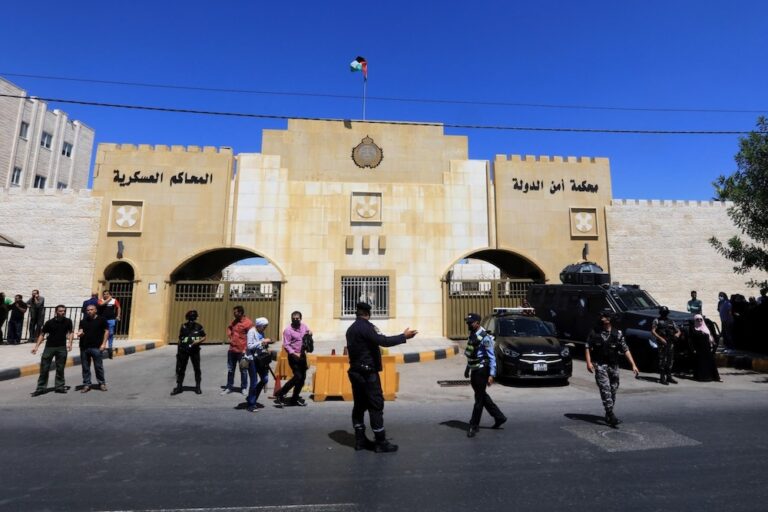(EOHR/IFEX) – The following is a 28 October 2005 report by the Arab Archives Institute, which is being circulated by EOHR under a partnership agreement: Access to Information Law in Jordan By the Arab Archives Institute In general, Jordan’s constitution allows free access to information to all Jordanian citizens. However, there is no direct provision […]
(EOHR/IFEX) – The following is a 28 October 2005 report by the Arab Archives Institute, which is being circulated by EOHR under a partnership agreement:
Access to Information Law in Jordan
By the Arab Archives Institute
In general, Jordan’s constitution allows free access to information to all Jordanian citizens. However, there is no direct provision that insists on that right or the tools to safeguard it. A new law introduced in 2005 may be the first of its kind in the region, yet amendments are needed if it is to fully guarantee access to information.
Due to Jordan’s long heritage of martial law until 1989, the culture of secrecy dominates and is reflected in almost all laws and legislation. At present, there are a number of laws that hinder access to information such as the Jordan Press Association Law (1998), the Penal Code (1960), the Defense Law (1992), Contempt of Court Law (1959), Protection of State Secrets and Classified Documents Law (1971), and the Press and Publications Law (1999).
The Jordanian government controls the different media, influences their independence and makes access to basic information almost impossible for journalists attempting to perform their jobs in a proper manner.
The draft Law on Access to Information was introduced in the past year, at a time when reform issues have been under the spotlight. Restructuring the media and rewording related laws are on the government’s agenda. But changes to provisions have been mostly superficial so far. Activists admit that the mere proposal of a law on Access to Information is in itself positive and unique in the Arab region. Jordan might be the only Arab country that strongly suggested drafting such a law at the governmental level.
In two daring surveys carried out by the Higher Media Council (HMC) in April, a lack of access to information was the main hindrance to journalists’ work. The surveys revealed that almost one-third of the 765 respondents, who were journalists and chief editors of daily and weekly newspapers, experienced lack of access to information.
The surveys measured the experiences of reporters and chief editors from July through December 2004. Both groups were asked to respond to separate lists of 15 questions – each pertaining to what would be considered obstacles to and violations of press freedoms.
They also showed that officials decline to answer journalists’ questions over important issues, there is selectivity in forwarding invitations to press conferences and meetings, and journalists are prevented from entering certain government premises and refugee camps. Periodically, governments issue memos to employees not to give any statements or information to journalists. Around 13 per cent of the respondents said they experienced interference in their work, while about 11 per cent said they received unofficial threats.
The draft Law on Access to Information presented by the government has many loopholes that prevent access to information and provide very few guarantees to journalists and citizens to ensure their right to acquire information.
Article 7 of the law prohibits public demand of information that has “religious, racial and ethnic discrimination or discrimination based on sex or colour.” This provision is very elastic and vague in content. It might be applied to simple information on cases of discrimination against women, for example, or crimes of honour, or the status of Christians in Jordan.
Article 13 of the draft law negates the real motives behind legislating a law on access to information. It gives authority to officials not to disclose information related to state secrets and confidential documents stipulated in other legislation. (Here there is a reference to the State Secrets and Confidential Documents Law which is in blatant contradiction with the right to have access to information.) The law prohibits civil servants from making public any classified document. There are four categories of classification: ordinary, restricted, secret and top secret. All categories including the ordinary document are considered secret unless authorisation is obtained.
This includes:
– Classified information obtained through agreements with other countries.
– Secrets related to national defense or state security or foreign policy.
– Information that includes analyses or recommendations or propositions or consultations given to the official prior to taking decisions which include correspondence and information exchanged among the different governmental departments.
– Personal and confidential correspondence through any means of communication with governmental departments and their reactions.
– Information, which when disclosed, influences negotiations between the kingdom and another country or another party.
– Investigations carried out by the general prosecution or security apparatus concerning any crime or case within their jurisdiction.
– Information that has a commercial, industrial, financial or economic nature as well as information on tenders, scientific and technical research that leads to violation of copyright or harms fair and legitimate competition and which leads to illegitimate profit or loss to any person or company.
This article is applicable to practically any valid information about any subject. Any demand for information by a journalist or a citizen could fall within one of these categories of article 13. Although experts and the president of the HMC who prepared the draft promised in a meeting with the Arab Archives Institute (AAI) that there will be a review of these provisions and others, the law does not provide an absolute guarantee to access to information in any of its provisions and restricts access to information more than it guarantees it.
The law also has the following shortcomings: The Access to Information Board is appointed by the government and not through election by parliament to ensure independence from the government’s decisions. The length of the period in which the Board must respond to complaints (one month) is too long. It should be a maximum of three weeks and could be extended by three more weeks in exceptional cases. Sanctions should be enforced against officials who destroy documents with ill-intent. The annual report of the Access to Information Board should be referred to Parliament and not to the the Prime Minister’s Office, as is the case with the Audit Bureau report.
In June, AAI, in cooperation with the Jordan Transparency Forum (JTF), organised a special conference to discuss and lobby to change restrictive provisions of the law. The Meeting was attended by HMC President Ibrahim Izzedine, legal advisors, politicians, journalists and university professors. The meeting discussed in depth the draft law, based on which directors of AAI and JTF were invited to discuss amendments to the draft law with the HMC’s President and advisors.
Although there was some tension when discussing article 13 of the draft, the President promised to look into suggestions made by AAI and JTF in an amended version to be submitted as attachment to the law to the Prime Minister’s Office. It is hoped the next year will witness more lobbying and awareness-raising about the dangerous provisions in the draft.
The draft law is supposed to be discussed by the Lower House of Parliament. But due to a royal decree to postpone the convening of Parliament for two months, (the Parliament’s ordinary session is constitutionally slated for 1 October,) discussion and endorsement of pending laws will be postponed too. When the House convenes, it will be time for the discussion of next year’s budget, which takes three weeks, followed by discussion and endorsement of draft legislation that falls under the emergency category. The law might or might not be approved this year or next. But in any case, real lobbying should be carried out to ensure that restrictive provisions are eliminated or at least limited to exceptional cases.


